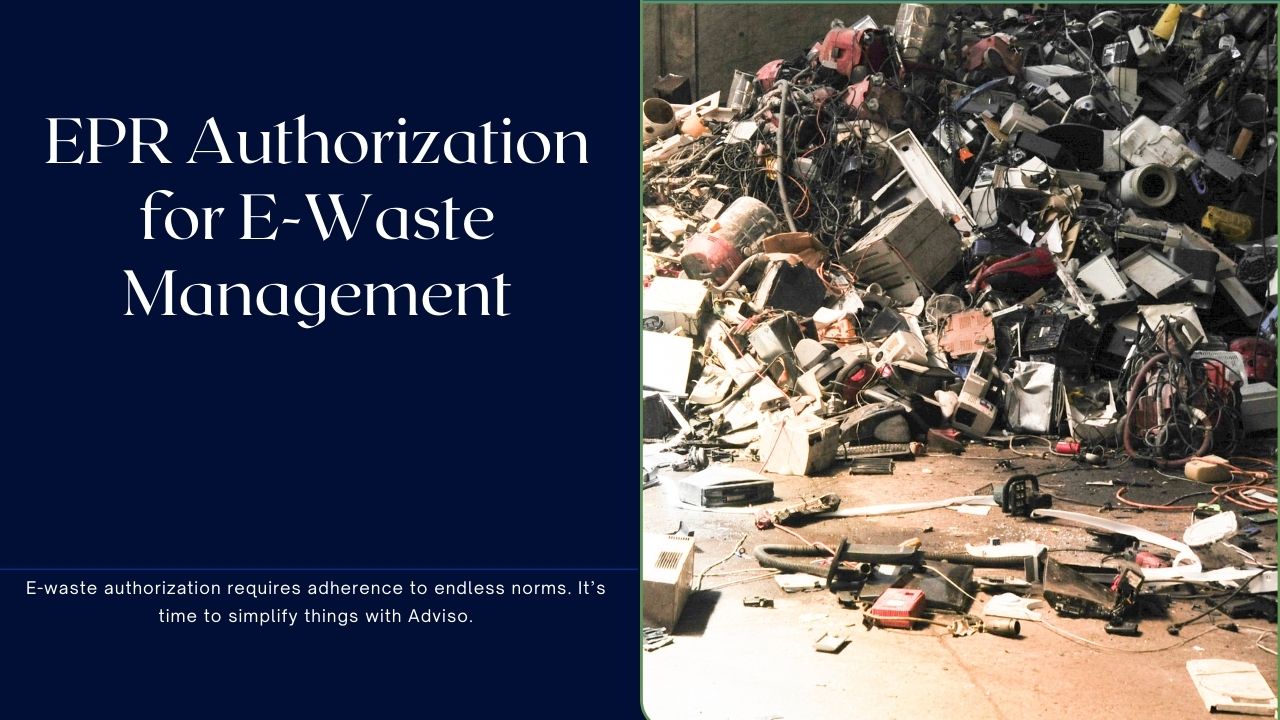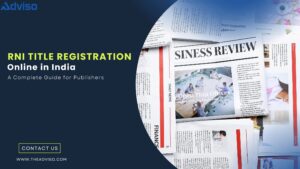EPR Authorization for E-Waste
In the modern world, electronics such as mobiles, laptops, and televisions have become such an important part of everyday life, that it is almost impossible to imagine a life without them. However, the growing use of such electronic products has also led to a growing need to dispose of these electronic products once their lifecycle is over. Such mass disposal of e-waste has caused serious threats to the environment, leading to growing concerns across the globe and a call for better e-waste management. Several countries have enacted legislation to improve e-waste management and one of them is India, which has mandated EPR authorization for E-waste management.
This helps ensure that the responsibility of disposing of such e-waste lies on the producer of such e-waste. The government has enforced several guidelines and rules which have to be mandatorily abided by the e-waste producers to be granted an EPR authorization for e-waste management. This is primarily ensured by the producer by various means such as buyback arrangements, schemes for the exchange of products, encouraging reuse of products, Deposit Refund System, and other means aimed at incentivizing the end user so that the e-waste can be efficiently managed, recycled or safely disposed of by the authorized collectors, refurbishes and recyclers in accordance to the rules mandated by the Central Pollution Control Board (CPCB).
Why is EPR Authorization for E-waste Management Important?
EPR Authorization for E-Waste Management is a mandatory process that is required by all Producers, Importers, and Brand Owners (PIBO) of Electrical and Electronic Equipment (EEE) to be able to sell in the Indian markets. This ensures that PIBOs take up the responsibility of safely disposing of their products at the use of their life cycle by meeting the targets set by the CPCB. This plays an important role in ensuring that all the harmful and toxic parts such as batteries, electronic chips, hazardous metals, and chemicals that are found in e-waste are disposed of in a manner that’s not harmful to the environment.
The lack of an EPR Authorization for E-Waste Management can lead to heavy penalties being imposed on the PIBOs and in extreme cases can even lead to suspension of license as well as imprisonment. This makes an EPR Authorization for E-Waste Management a vital step for every PIBO looking to sell in India.
What are the Rules Pertaining to Extended Producer Responsibility (EPR) for E-Waste?
While Sweden became the first country to enact EPR authorization in 1988, the concept of EPR has been in the works for a very long time and was finally introduced in 2011 under the E-waste (Management and Handling) Rules, 2011 in an effort to shift the burden of responsibility of proper E-waste management from the end use consumer to the producer of electronic product. Thereafter, the E-waste (Management) Rules, 2016 were also introduced with the aim of identifying the additional stakeholders such as recyclers, collectors, and refurbishes, who could play a vital role in facilitating safer and more efficient management of e-waste in India. The rules were later replaced by the E-waste (Management) Rules, 2022 with updated guidelines.
To Whom Does the EPR Authorization Apply?
The EPR rules apply to the following entities, commonly known as PIBOs –
- Producers or Original Equipment Manufacturers (OEMs)
- Importer
- Brand Owner
- E-Waste Processors that are engaged in (1) Recycling (2) Converting Waste to Energy (3) Converting Waste to Oil (4) Industrial Composting
What are the Benefits of EPR Authorization for E-Waste Management?
While the EPR Authorization for E-Waste Management is a mandatory obligation to be able to sell in the Indian markets, it also brings with it a host of benefits such as –
- Positive Brand Image – With an increasing environmentally aware consumer base, the implementation of EPR guidelines has become an integral part of marketing practices which will help boost the brand image of the producer and lead to an increase in customer loyalty.
- Cost Efficiency – Setting up well-optimized systems of e-waste management can allow PIBOs to reduce the overall waste, boosting operational efficiency, and may also help in developing new revenue streams by recycling and reducing plastic products, leading to a reduction in the costs of production and can lead to more money being saved by the PIBOs.
- Positive Environmental Impact – EPR Authorization for e-waste management boosts the management and disposal of e-waste waste by PIBOs in India. This helps reduce the massive amount of e-waste that eventually finds its way into the landfills and dumps which leads to serious consequences for the environment. The safe and proper management and disposal of such e-waste ensures that the environment is free from such threats.
- Aids in Sustainable Development – EPR Authorization for e-waste management also helps in promoting the conservation of natural resources and brings us closer to achieving the Sustainable Development Goals (SDGs). This helps us ensure that we leave a better, cleaner, and safer future for future generations.
- Promotes Reuse of Products – EPR Authorization for e-waste management also streamlines the process of collection and recycling of the product, helping cut down the amount of resources used. It also facilitates the reduction of e-waste products by encouraging consumers to reuse the same.
What are the Documents Required for EPR Authorization for E-Waste?
The documents required for plastic producers vary according to their classification. They are as follows –
- Holistic EPR Plan as per the guidelines specified by CPCB or SPCB
- Copy of agreements with the e-waste collection, processing, recycling agencies and Treatment, Storage and Disposal Facilities (TSDFs)
- Memorandum of Association
- Declaration as per the format provided in the guidelines including a declaration for compliance with Reduction of Hazardous Substances (ROHS) rules
- Copy of DGFT license/ permission (IEC certificate)
- Taxpayer Identification Number (TIN) and Corporate Identification Number (CIN)
- The Aadhar Card of the authorized person and PAN card of the Company involved in the Business
- Valid Consent Certificate from the relevant Ministry/ Department for selling the EEE product
- Proof of Ownership of the Business
- Import Export Certificate in case of importers
- Self-attested copy of the GST Certificate of the Company
- Copy of agreement with PRO, if applicable
What is the Process of Obtaining EPR Authorization for E-Waste Management?
The PIBOs have to follow the following steps to successfully obtain the authorization-
- Log into the online EPR portal and initiate the registration process.
- Fill in the relevant information as required in the Form-1 of E-waste management such as details of the factory, know your customer, etc.
- Provide all the requisite documents as specified by CPCB.
- Pay the requisite fees and submit the application.
How is the Application Processed?
Once the application is submitted, it is processed by the CPCB as follows –
- The application shall be submitted within 15 working days, after which the registration shall either be approved or rejected.
- If the application is found to be incomplete during the processing, the applicant shall be informed about the same and be given time for rectification.
- If the authority finds any false or incorrect information, the application shall be rejected and the application fee shall be deemed to be forfeited.
- The Portal has a provision for the internal processing of applications within the CPCB, wherein the Member Secretary of the CPCB shall act as the Issuing Authority for the Certificate.
- Portal-generated Registration certificate with a seal and sign of the Competent Authority shall be uploaded on the Portal within 7 days.
- Copy of the Registration along with the EPR Action Plan shall be shared with the concerned SPCB/PCCs and the Nodal Agency designated by the State Government/ UT Administrator.
- Fresh registration is granted for a period of 1 year while subsequent registration is valid for a period of 3 years from the date of grant of Registration.
What is the Fee for EPR Registration for Plastic Waste?
The Government fee for the EPR Authorization for e-waste producers is a combination of a fixed fee and also the annual e-waste generation capacity of the company in Tonnes Per Annum (TPA) as per E-waste (Management) Rules, 2022 and is classified as follows –
| S. No. | User Type | Activity | Registration Charge |
| 1 | Recycler | New Recycler (1st time registration valid for five years) | Rs. 15,000 |
| Renewal of registration – (after five years) | Rs. 7,500/- + 0.625/MT for quantity of EPR certificate transaction in the preceding five years | ||
| In case of any amendments/addendum | Rs. 3,000 | ||
| 2 | Refurbisher | New Refurbisher (1st time registration- valid for five years) | Rs. 15,000/- |
| Renewal of registration- (after five years) | 7,500/- + 0.625/MT for quantity of Refurbishing certificate transaction in the preceding five years | ||
| In case of any amendments/addendum | Rs. 3,000 | ||
| 3 | Manufacturer | One time registration | Rs. 15,000 |
| Annual Maintenance charges for all stake holders | Annual Maintenance charges for Producers, Recycler, Refurbisher and Manufacturer | Rs. 5,000 |
The fee structure for Producer for registration on EPR Portal under E-Waste (Management) Rules, 2022
| S. No. | Annual E-Waste (MT) | Registration Charge |
| 1 | <50MT | Rs. 2500/- |
| 2 | 50MT to <100MT | Rs. 7500/- |
| 3 | 100 MT to <1000 MT | Rs. 1,50,000/- |
| 4 | 1000 MT to <5000 MT | Rs. 10,00,000/- |
| 5 | >5000 MT | Rs. 15,00,000/- |
Note: For Producers whose sales just started, the registration fee will be Rs. 10,000/- and the the renewal fee is same as the registration fee.
Can the EPR Authorization be Refused?
As per rule 13 (1) (ili) of E-Waste (Management) Rules, 2022, the CPCB can refuse EPR authorization to an applicant. In case, an applicant is not able to provide the requisite details on Quantity placed on the market, EPR plan and RoHS Self-declaration, agreement copy with authorized dismantlers/ recyclers within 45 days of receipt of a letter from CPCB or date of updation of status at CPCB web portal and application will be returned by CPCB.
An opportunity will be given to hear the applicant within one month from the date of return of application (by post or at the CPCB web portal), before considering the case for refusal of grant of PR authorization by CPCB. The cases for hearing shall be placed before the Chairman, CPCB periodically after taking suitable dates from the Chairman’s office, and within 10 days after the hearing, the dealing officials shall place the file with facts/ reasons for recommending refusal of authorization. Chairman CPCB will be the final authority for deciding on refusal.
Can the EPR Authorization be Cancelled or Suspended?
According to rule 13 (1) (ix) of the E-Waste (Management) Rules, 2022, the CPCB may cancel or suspend the EPR authorization of the Producer, in case a Producer fails to comply with any of the conditions of the authorization or with any provisions of the Environment (Protection) Act, 1986 or E-waste (Management) Rules, 2016 during the period of authorization. If any producer is found to be violating the provision of authorization, during random checking by CPCB or based on verification by SPCBs, a notice may be issued by CPCB within 25 days.
An opportunity will be given to hear the Producer within one month from the date of issuance of notice; before considering the case for cancellation or suspension of EPR Authorization by CPCB.
The decision on cancellation or suspension of the authorization will be intimated within 10 days after the hearing. Chairman CPCB will be the final authority for deciding on cancellation or suspension.
What is the Process of Appeal?
Any person who is aggrieved by the CPCB’s order of cancellation, suspension, or refusal of authorization may appeal vide Form 7 to the Appellate Authority, which is the Secretary or the nominee of the Secretary, Ministry of Environment, Forest and Climate Change, Government of India, New Delhi.
Why Adviso?
If you are a PIBO looking to sell EEEs in India, the EPR Authorization for e-waste management is mandatory and non-confirmation of such rules can lead to the imposition of heavy penalties by CPCB. However, the process of obtaining EPR Authorization involves several steps and can be quite cumbersome. So, it’s best to take the aid of professional services like Adviso.
Adviso has a team of experts who can provide one-stop support for all your legal requirements concerning your EPR authorization within a minimal budget. Drop us a message and our team will be delighted to discuss your requirements and help you resolve all your queries.
Conclusion
Obtaining an EPR registration is a mandatory step for PIBOs dealing with Electrical and Electronic Equipment (EEEs). It is a forward-looking step by the government to enable better management and safer disposal of the huge amounts of e-waste generated by these companies and by taking this responsibility, the producers actively contribute to the development of an environmentally sustainable future.
Thus, it is critical for companies to understand and actively implement the EPR Authorizations as well as actively develop more sustainable practices if they want to cater to the Indian markets. In such cases, it is best to take the aid of professional services like Adviso which can play a vital role in ensuring that the requirements of EPR Authorization for E-Waste Management are met efficiently and allow the companies to continue to focus on growing their business without facing legal hurdles and challenges.
Read Our Article: How To Register A Company In Zambia




